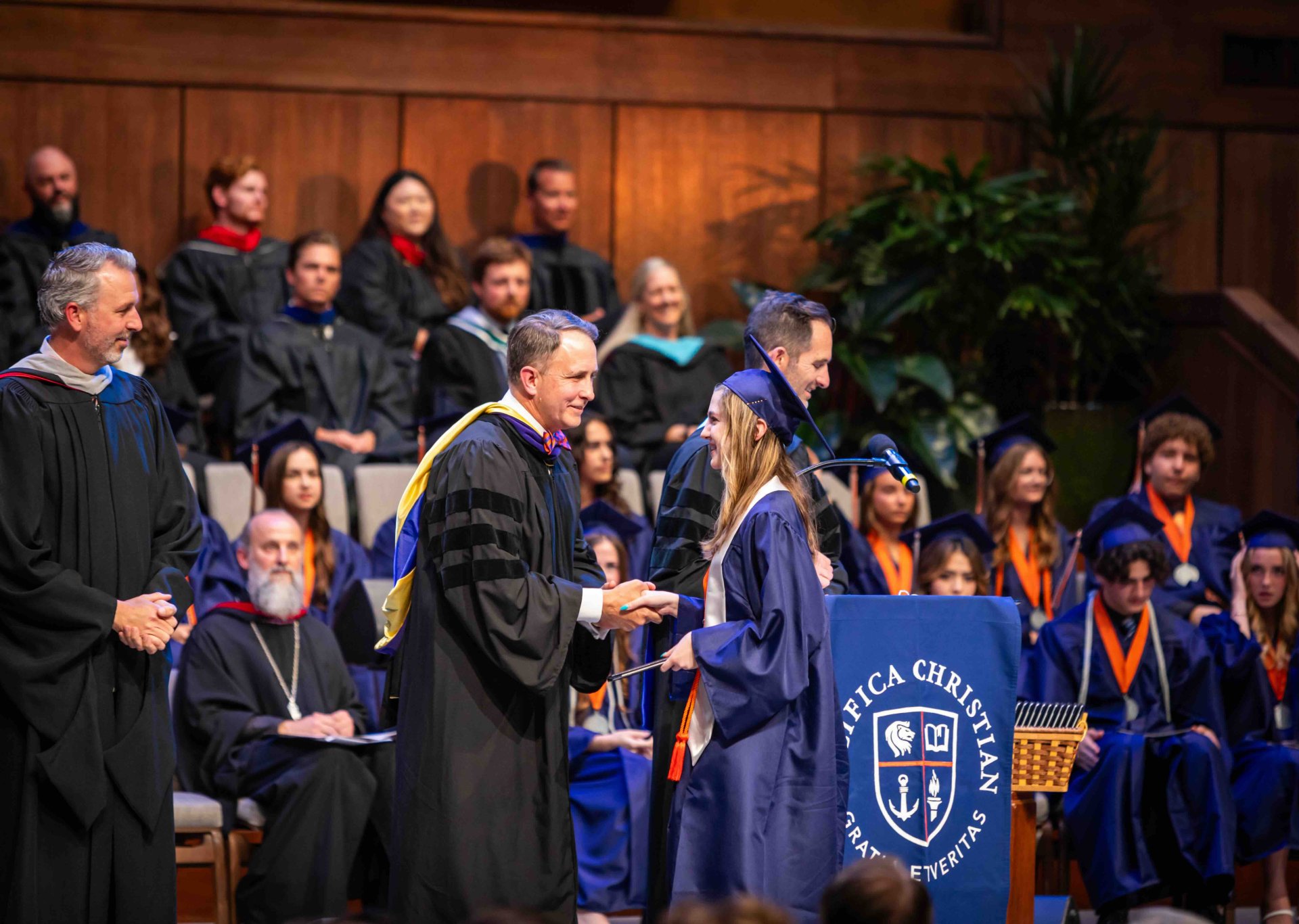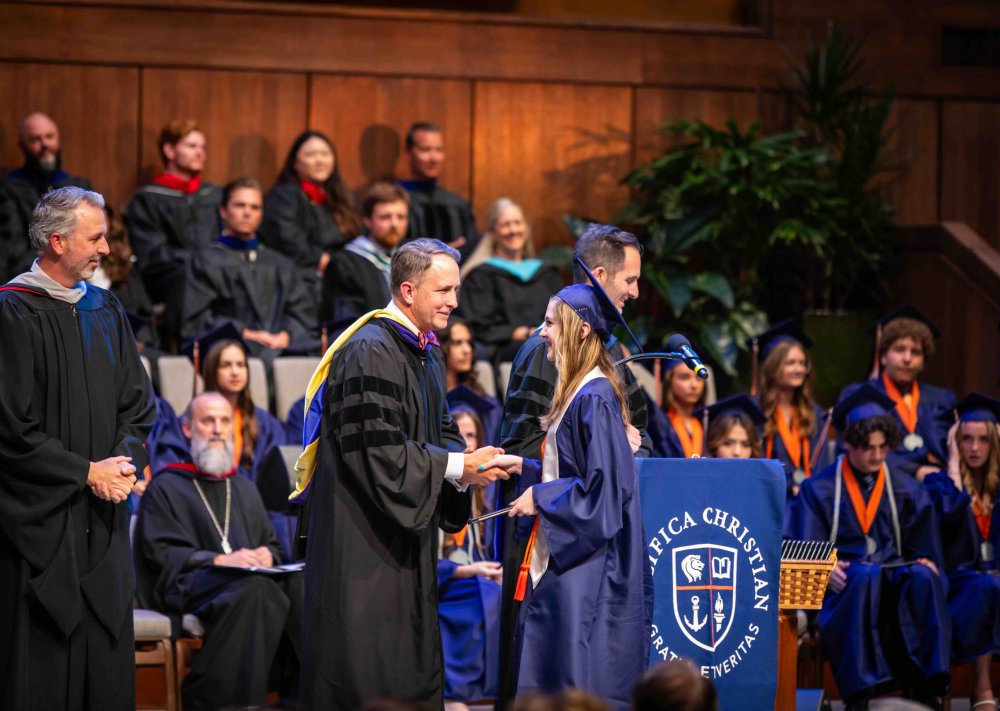Pacifica builds on God's "sure foundation" through The Great Conversation
December 17th, 2023
Behold, I lay in Zion a stone for a foundation,
A tried stone, a precious cornerstone, a sure foundation;
Whoever believes will not act hastily.” Isaiah 28:16
Isaiah wrote that in the 8th Century, B.C. In this season of Advent, when we remember the coming of that “precious cornerstone”—Jesus—and anticipate his coming again, we can look back on what has been built on the “sure foundation” in the past year, and the past centuries. We see the prophet reminding us that our belief impacts our actions. Our thinking impacts our living, and vice versa. And there are two starkly different ways to approach life: building on God’s foundation or on man’s.
Since its founding, Pacifica has offered The Great Conversation (TGC) events to the entire community. In fact, in 2015, we prepared for our first event—a CS Lewis symposium—before the school even opened. This year, we returned to our founding and launched The Lewis Dinner, themust-attend annual TGC event.
Beyond the special dinner, we also covered diverse topics, presented by thought leaders in their fields. From Isaiah’s Great Scroll written centuries before Christ, to an 18th Century economist, to 20th Century foreign policy, to the importance of contemporary fatherhood, to how we might live in a “post-Christian” society, TGC offered deep insights on a broad set of topics. Each gave attendees not just a better ability to think about our world but also transformed our ability to live in it. And they helped forge some new friendships along the way.
Despite the diversity of eras and topics, we saw Isaiah, Adam Smith, Ronald Reagan, and CS Lewis were connected by their respective work to build—and live—from a common “sure foundation.” They shared a worldview, one that pointed to a distinct way to think well and to live well, a way that promotes human flourishing and diminishes oppression.
In January, the University of Florida’s Dr. Will Inboden spoke on his new award-winning history of Ronald Reagan, titled The Peacemaker. The Matthew 5-inspired title reflects Reagan’s abiding foreign-policy goal of avoiding nuclear war. Reagan’s way of doing so departed from prior U.S. strategy and popular media opinion. He did not “act hastily,” but did challenge human-rights abuses, free the economy, increase military spending, and seek to develop a missile defense, all to peacefully end the Cold War, and all while standing firm in the face of intense criticism. Reagan saw the choice between two divergent worldviews in terms of forms of governance: freedom and democracy or central planning and tyranny. He felt the former honored human dignity, and the latter crushed it.
In March, scholars from the Acton Institute expanded upon the choice between these two worldviews. They presented on the importance not just of a “free” society, or a “virtuous” society, but of a “free AND virtuous” society. Without both, we risk becoming a tyrannical and vicious society.
Fr. Robert Sirico reminded us: all humans have an innate dignity, have the ability to reason, and that there is a natural law written on our hearts. But growing confusion about liberty’s meaning is degrading our society. Reason and true liberty are now replaced with mere sentiment and passion. Becoming detached from proper theological and philosophical principles—the moral basis for a free society—leads to a loss of liberty, which has serious and harmful effects on our everyday lives. Our innate dignity demands we be free to exercise our reason. But freedom without virtue imperils self-government, creating anarchy—and tyrants arise in times of anarchy to restore order. Thus, unbounded freedom can give rise to tyranny—under which human flourishing is impossible.
Next, as the world marked the 300th anniversary of Adam Smith’s birth, Mr. David Bahnsen explained that the debate over Smith’s legacy is rooted in the same modern division: was he a moral philosopher or did he promote freedom (especially in the economic realm)? This false division between freedom and virtue, we heard, misses the importance of “and”. We can live in a way that both promotes freedom and is loving to our neighbors. If that is not possible, a lawless realm of the strong destroying the weak arises—liberty unbounded by virtue. The historical response: a highly centralized, highly controlling government takes over and uses force to control its citizens in the name of “fairness.” Then, in the name of fairness, all but the rulers lose their freedom.
Dr. Anthony Bradley then gave us a practical way we might both keep our freedom and promote virtue—having a generation of excellent (and fun!) fathers (more wrestling with your kids, please.) As he explained, with irrefutable social-science data, “fathers are the most important men in any community anywhere.” Our society’s de-emphasis on training young men to become good fathers necessarily leads to our society’s inability to remain free, as freedom must be paired with virtue. And virtue must be taught.
In April, Oxford scholar, Dr. Andrew Newell, discussed another facet of these divergent worldviews speaking on “The Post-Christian Worldview as New Religion.” This “new religion,” unmoored from the traditional teachings of Christianity, preaches a utopian vision for our world. It promises peace and prosperity here and now, not unlike the early Soviet claims for their revolution. It makes claims to a perfect future, reminiscent, Dr. Newell said, of Isaiah 11, where “The wolf also shall dwell with the lamb...” He explained this worldview’s foundation: hope in technology. If we obey it, they argue, technology and progress have the power to transform our messy world into a perfect one. But this is not Isaiah’s vision for a new earth, they claim it can happen here and now, by simply unleashing man’s desires and cleverness.
But can man, on his own, without connection to God, simply make the world as he wants it? And is how he wants it to be the standard for how it ought to be? Is there objective reality or only our subjective thoughts and feelings? Dr. Michael Ward explained CS Lewis’s views on this during his September dinner talk “Love is Tears: Waterfalls in the Chronicles of Narnia and The Abolition of Man.” Ward explained Lewis’s attack on the “new worldview” that is rooted on the unstable foundation of mere personal feeling or preference, rather than on Isaiah’s vision of the Lord’s firm foundation, God’s love shown in Christ. Are life’s “values” just whatever we pick (subjectivism), or are they beyond us, rooted in something objective, in a reality beyond our mere feelings (objectivism)? Lewis believed subjectivism destroys our humanity, our ability to flourish, as we give up seeing what “really is” for what we “want things to be.”
And Ward showed how Lewis’s waterfalls—at the beginning of Abolition of Man, throughout Narnia, and in other works—show objective as well as subjective value.
Lewis’s fascination with waterfalls arose, I suggest, because of his poetic insight into their meaningfulness. Great cataracts are beautiful simply at the visual level; but at the spiritual level they are even more beautiful, symbolizing the everlasting mercy of God. And insofar as a waterfall remains the same shape but constantly changes its contents, it reflects what Augustine said of God’s beauty, that it is ever ancient, ever new. At the end of The Last Battle, we read that: “Aslan himself was coming, leaping down from cliff to cliff like a living cataract of power and beauty.” He comes down to beckon the children to come further up and further in. And what is beautiful in God is obviously the most beautiful thing in man, when we human beings learn to give ourselves away in love, our hearts overflowing.
This pouring out of ourselves, like a waterfall always pouring forth, is the virtuous life we seek to live, and to train the next generation for. There is a way of living that connects our personal desires—our subjective tastes—to objective reality, to a “sure foundation.” These great TGC lectures taught us throughout 2023 that there are two paths before our world, and the one we must choose is narrow, but it is good. To stray from it hurts our families, our economy, our foreign policy, our use of technology, indeed all things that would allow us to flourish as humans made in God’s image.
It was good to hear these speakers on these topics this year, as human flourishing is under great threat in our world today. Their reminders of good ways to think, good ways to live, brought us nicely to our final TGC. Last month, Dr. Kenneth Way, Old Testament Department Chairman at Biola University, walked us—literally walked us, it was over 20 feet long!—through a remarkable facsimile of the Great Isaiah Scroll discovered near the Dead Sea. Beyond the miraculous history of its discovery and preservation, its Christ-oriented prophecy, and its demonstration of the reliability of our modern scriptures, it pointed us again to our foundation. Isaiah foresaw the true foundation for peace, government, fatherhood, and a loving and mighty God, all of the topics TGC covered this year:
“For unto us a Child is born,
Unto us a Son is given;
And the government will be upon His shoulder.
And His name will be called
Wonderful, Counselor, Mighty God,
Everlasting Father, Prince of Peace.
Of the increase of His government and peace
There will be no end.” Isaiah 9:6
Which is a fitting way to close, and to wish you all a very “Merry Christmas.” Through our TGC events, we hope Pacifica students and the broader community have benefited by Pacifica’s teaching, pointing everyone to our “precious cornerstone.” In case you missed them, we invite you to watch these talks—and those from previous years—on Pacifica’s TGC–The Great Conversation YouTube channel linked here.
 Friend, together, we are impacting the next generation, training future leaders to stand on a “sure foundation” to choose a path of freedom and virtue, anchored in God’s truth. We welcome your prayers, your time and talents, and, of course, your treasures in pursuit of this noble endeavor. Please consider partnering with us to make more TGC events possible in the coming year by donating today.
Friend, together, we are impacting the next generation, training future leaders to stand on a “sure foundation” to choose a path of freedom and virtue, anchored in God’s truth. We welcome your prayers, your time and talents, and, of course, your treasures in pursuit of this noble endeavor. Please consider partnering with us to make more TGC events possible in the coming year by donating today.
In gratitude,
Keith Carslon
Chairman of the Board of Trustees
P.S. Be sure to bookmark our TGC webpage to stay up-to-date on future events.








